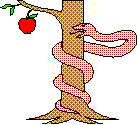 The temptation to add to God's commands dates all
the way back to the Garden of Eden. God had told Adam and Eve,
"but of the tree of the knowledge of good and evil you shall
not eat, for in the day that you eat of it you shall die"
(Gen 2:17).
The temptation to add to God's commands dates all
the way back to the Garden of Eden. God had told Adam and Eve,
"but of the tree of the knowledge of good and evil you shall
not eat, for in the day that you eat of it you shall die"
(Gen 2:17).
Books and eBooks by the Director
"JUDGE NOT ..."
By Gary F. Zeolla
"Homosexuality is a sin, and the Bible speaks to this" is a quote from a recent letter.... In the Bible, it also states "judge not lest ye be judged." Truly, [a person's] lifestyle should not be judged by us, as no one but God has the right to do so... (The Valley News Dispatch, 3/16/95, p.A7).
The above is taken from a "Letter to the Editor" in this writer's local newspaper. The manner in which Matthew 7:1 is being applied here is common. People often quote this verse when someone declares a certain behavior is wrong. But is Jesus teaching that people should not make judgments as to other's lifestyles?
Judging vs. Proclaiming
The letter writer is correct when he writes, "no one but God has the right" to judge a person's lifestyle. However, in the case of homosexuality, God has already expressed what His judgment is of this lifestyle. Leviticus 18:22 declares, "You shall not lie with a male as with a woman. It is an abomination" (see also Lev 20:13; Rom 1:24-27).
So when Christians say, "Homosexuality is a sin" we are NOT judging other's lifestyles; we are PROCLAIMING what God's judgment of this lifestyle is! And when the Bible speaks clearly on a topic, not only is it appropriate for Christians to proclaim this absolute, but it is our duty to do so (Ezek 3:18; Acts 20:26,27).
As John Calvin comments, "We are not only permitted, but are even bound, to condemn all sins.... It is His will that we should PROCLAIM the sentence which He pronounces on the actions of men: only we must preserve such modesty towards each other, as to make it manifest that He is the only 'Lawgiver and Judge'" (Isa 33:22; Calvin, p.347). The second half of Calvin's comment leads to the next point.
Adding to God's Commands
 The temptation to add to God's commands dates all
the way back to the Garden of Eden. God had told Adam and Eve,
"but of the tree of the knowledge of good and evil you shall
not eat, for in the day that you eat of it you shall die"
(Gen 2:17).
The temptation to add to God's commands dates all
the way back to the Garden of Eden. God had told Adam and Eve,
"but of the tree of the knowledge of good and evil you shall
not eat, for in the day that you eat of it you shall die"
(Gen 2:17).
However, when Eve repeats this command to the serpent, she states, "but of the fruit of the tree which is in the midst of the garden God has said, 'you shall not eat it, NOR SHALL YOU TOUCH IT, lest you die'" (Gen 3:3). God did not say anything about not TOUCHING the tree of the knowledge of good and evil.
This problem has continued through the centuries. The New Geneva Study Bible comments about the Pharisees of Jesus' time, "They substituted human traditions for authoritative law, binding consciences where God had left them free (Mark 2:16-3:6; 7:1-8). At heart they were hypocritical, seeking human approval for themselves and condemning others" (Luke 20:45-47; Matt 6:1-8; 23:2-7; p.1544).
And today, many new "human traditions" have been invented. As Garry Friesen writes in his book Decision Making and the Will of God, "The twentieth century American church has managed to divide itself over a whole range of issues." He then lists over thirty practices in which, "... there are sincere believers who consider the activity in question prohibited by God, while equally sincere brothers maintain that participation is within the Christian's freedom" (p.382).
In his list are such things as: attending movies, watching TV, drinking wine in moderation, women wearing two piece swim suits, mixed swimming, playing cards, smoking, dancing, using a Bible translation other than King James, playing guitars in church, listening to rock music, men wearing beards, and unmarried couples kissing.
Friesen then comments, "People who read this list tend to
react with laughter and incredulity. On the one hand, they
chuckle at the items that are 'obviously' in the area of freedom.
On the other hand, they can't believe that anyone could feel free
before God to do the things that are 'obviously' forbidden by the
principles of Scripture" (pp.382,3).
I know strong feelings can run on these matters as I have already presented my position on one of these topics: "using a Bible translation other than King James." In my book Differences Between Bible Versions, I express my view that while the King James Version (KJV) is a reliable translation, so is the NEW King James Version (NKJV). I also explain why I do not believe the KJV is inspired in and of itself (see Bible Versions Controversy).
Since the publication of my book I have received many letters with tracts enclosed from "KJV Only" advocates. And the only word I can use to describe these tracts is "vicious." In them, the NKJV is called: crummy, corrupted, perverted, polluted, apostate, communist, Satanic nonsense, and New James rat's nest.
The translators of the NKJV are said to be: ignorant, deluded, corrupters of the pure bread of life, horrendous liars, money-mad apostates, and phony Greek scholars. Readers of the NKJV are called: foolish, gullible, suckers, and madmen (from tracts by Chick, Reynolds, and Ruckman).
Personally, I find reading such venom very difficult. And I believe such dogmatism and self-righteousness is what Jesus, in part, is referring to when He says to, "Judge not" (compare James 4:11,12). On the other hand, when I critique various Bible versions (and discuss other controversial subjects), I try to avoid such language. Instead, I detail the reasons for my view in a clear and objective manner (as I hope the following articles show).
At times I may be bold in my approach (2Cor 3:12; Eph 6:19); but I hope no one would call my writings "vicious" (Eph 4:15,29; Col 4:6). Further, I am always willing to listen to Scriptural or logical arguments as to why someone believes my position is incorrect on any topic. And, as Christians, we should be willing to listen to the advice of others (Prov 11:14; 18:13,15).
Moreover, it is often imperative to listen to and study both sides of a controversial subject before making a decision (as I have done in regards to the Bible versions and "KJV Only" controversies; Prov 18:13,17). And when we give advice to others, it should be, "with all longsuffering and teaching" (2Tim 4:2). An angry attitude can do more harm than good (Prov 18:19). Matthew Henry summarizes this section well:
"We must
judge ourselves, and judge of our own acts,
but not make our word a law to everybody" (p.33).
"Be Patient With Me ..."
At a Bible study I attended a few years ago, there was a young woman who was using some of the most "foul" language I had ever heard. Meanwhile, she claimed to be a Christian! Afterwards, I asked the study leader (somewhat self-righteously), "How can that woman be a Christian with the foul mouth she has?"
He replied, "A year ago, she was a prostitute, stung out on drugs, living on the streets. Since becoming a Christian, she has ceased to prostitute herself, has gotten off of drugs, and is now working a decent job and living in a place of her own. I'm sure God will get to the language eventually, but He had more important things to deal with in her life first."
When you see someone who claims to be a Christian engaging in an act that you believe is inappropriate, remember: you may not know the person's background and how far God has already brought the person. God will eventually, but probably gradually, complete the good work He has begun in that person's life (Phil 1:6; 2:12,13). A saying seen on Christian T-shirts expresses this thought well:
"Be
patient with me; God is not finished with me yet!"
(Psalm
138:8; Phil 3:12-14).
Abiding by Our Own Standards
C.H. Spurgeon observed, "I know how it is with some Christians; they have grown in grace so wonderfully, that they want everybody to be up to their height, and not three-quarters of an inch below it" (p.217). And this astute observation by "The Prince of Preachers" introduces the last point to be addressed in this article.
The verse following Matthew 7:1 reads, "For with what judgment you judge, you will be judged; and with the same measure you use, it will be measured back to you."
Be sure to note the "For" at the beginning of this verse. This conjunction indicates that what follows is the reason for what preceded. In this case, Jesus is saying the reason we should not judge others is because we will be judged by the same standards we apply to them.
So if we expect immediate perfection from others, God will expect immediate perfection from us. And if we are not patient and forgiving with others, God will not be patient and forgiving with us (Matt 18:21-35; James 2:13).
Further, remember all the "human traditions" people have a tendency to add to God's law? Well, if you are going to expect others to abide to this legalism, you are duty bound to abide by the same high standards (Rom 2:1-3). And, as Matthew Henry warns, "What should become of us, if God should be as exact and severe in judging us, as we are in judging our brethren!" (p.33).
Moreover, when people become obsessed with keeping such legalistic standards, they can begin to neglect, "the weightier matters of the law: justice, mercy, and faith" (Matt 23:23; also Rom 14:17). So legalists can end up with a "plank" in their own eyes while trying to remove a "speck" out of someone else's (Matt 7:3,4).
Henry comments, "Here is a just reproof to the censorious, who quarrel with their brethren for small faults, while they allow themselves in great ones" (p.33).
And with all these "extra" laws added to God's Law, it can become very easy to break a law we condemn another for not keeping. This will lead to us being called "Hypocrites" and bring reproach on the body of Christ (Matt 7:5; Rom 2:21-24). Also, in extreme cases, legalism can have dire consequences (see Jehovah's Witnesses & Blood Transfusions).
Summary and Conclusion
 John
the Baptist proclaimed to Herod, "It is not lawful for you
to have your brother's wife" (Mark 6:18). In doing so, John
was NOT breaking Jesus' command to "Judge not" as the
Bible clearly teaches this behavior is sinful (Lev 18:16; 20:21).
John
the Baptist proclaimed to Herod, "It is not lawful for you
to have your brother's wife" (Mark 6:18). In doing so, John
was NOT breaking Jesus' command to "Judge not" as the
Bible clearly teaches this behavior is sinful (Lev 18:16; 20:21).
Similarly, it IS appropriate for Christians today to proclaim, "Homosexuality is a sin" or "Fornication is a sin" or "Adultery is a sin" because the Bible clearly teaches these behaviors have already been judged by God to be wrong (1Cor 6:9,10). But, we should be cautious when we make such proclamations. We need to be sure the behaviors are in fact clearly condemned in the Word of God and are not just "human traditions" we have added to the Scriptures (Rom 14:5,6).
And we need to be wary about the attitude in which we give advice to others, allow God time to work in another's life, while looking more carefully at our own lives than we do at the lives of others (Rom 14:1-4,10-13). To conclude, the New Geneva Study Bible comments:
"Condemning
others for their faults
is failure to exercise forgiveness (Matt 6:14,15);
only a gentle and humble criticism that
first recognizes one's greater faults can help"
(p.1515; Gal 6:1-5).
Bibliography: Note: All emphases in quotes are added.
All Scripture references from: The
New King James Version. Nashville, TN: Thomas Nelson
Publishers, 1982, unless otherwise indicated.
Calvin, John. Institutes of the Christian Religion. Vol. XVI.
Grand Rapids, MI: Baker Book House, reprinted, 1979.
Chick, Jack. "The Attack." Chino, CA: Chick
Publications, n.a.
Friesen, Garry. Decision Making and the Will of God.
Portland, OR: Multnomah, 1980.
Henry, Matthew. Mathew Henry's Commentary on the Whole Bible
. Vol.III. New York: Thomas Nelson, 1979.
Reynolds, M.H. "New King James Bible Examined." Los
Cos, CA: Fundamental Evangelistic Association, n.a.
Ruckman, Peter. "A Critique of the New King James
Bible." Pensacola, FL: Bible Baptist Bookstore, 1979.
Sproul, R.C. editor. New Geneva Study Bible: NKJV. Nashville,
TN: Thomas Nelson Publishers, 1995.
Spurgeon, C.H. Pictures from Pilgrims Progress.
Pasadena, TX: Pilgrim Publications, reprinted, 1992.
"Judge Not ...." Copyright © 1999 by Gary F. Zeolla of Darkness to Light ministry (www.zeolla.org/christian).
The above article originally appeared in Darkness to Light
newsletter in 1995.
It was posted on this website in July 1996.
![]() Problematic Theologies
Problematic Theologies ![]() Ethics, Spirituality, Christian
Life
Ethics, Spirituality, Christian
Life
![]() General
Ethics: Ethics, Spirituality, Christian Life
General
Ethics: Ethics, Spirituality, Christian Life
![]() Alphabetical
List of Pages
Alphabetical
List of Pages ![]() Subject
Index
Subject
Index
![]() General Information on Articles
General Information on Articles
![]() Contact Information
Contact Information
Darkness
to Light Home Page
www.zeolla.org/christian